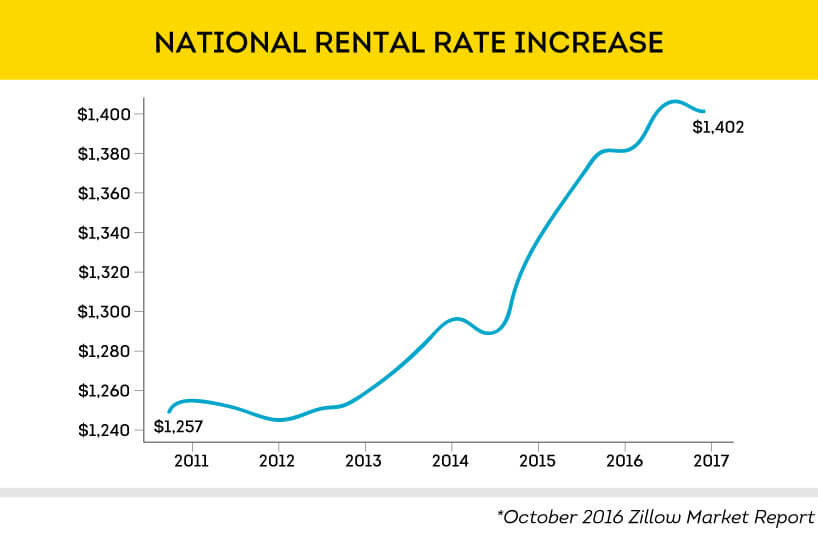Summary:
A straightforward guide for landlords on whether to raise rent and tips on how to do it. 88% of the property managers surveyed by Rent.com increased their rental rates over the past year (2015 Property Manager Report). If you are one of those landlords and you already have a rent raising process in place, kudos. However, if you’ve been worried about how to raise the rent on a tenant, read on to see whether you should and how you can manage the process.
Disclosure and Disclaimer
This post only contains educational information. No financial, tax or legal advice.
This information is for educational purposes only and we do not guarantee the accuracy or completeness of this information. This website may contain links to third party websites. We are not responsible for their content or data collection. Trademarks used in this material are property of their respective owners and no affiliation or endorsement is implied. Remember that this material is intended to provide you with helpful information and is not to be relied upon to make decisions. This information does not constitute financial, tax or legal advice and you should consult your own professional adviser regarding your situation.
Before you start raising rent, you’ll want to do some market research and find out the going rate for rent in your neighborhood. Raising the rent too high will most certainly generate tenant complaints, and could mean you lose a good tenant who leaves to find something more affordable.
Check the market rate for rent in the area of your property by talking to property managers who handle similar properties, asking real estate agents, and looking at rental advertisements. Rentometer is another useful tool for searching rental price comparisons in your area.
Step 1. Determine why you should raise the rent
In order to ensure that being a landlord is profitable for you, you’ll need to keep up with expenses and maintain a positive cash flow. Raising the rent may be the right way to do that. If you do decide to increase your rent, consider your expenses in the following areas:
- property taxes
- higher utility costs
- HOA dues
- insurance premiums
- property manager
- cost-of-living expenses
- maintenance
Factor these expenses into rent cost during tenant turnovers or lease renewals to make sure you’re charging enough.

National average rent increased 12.5% since 2011
Step 2. Calculate how much to raise the rent
According to Zillow, rents increased 12.5% from 2011 to 2016. Additionally, SmartMove research shows that it appears to be a landlord’s market which gives landlords greater power to raise rents as competition for rental housing grows. However, markets vary dramatically, even within the same metropolis, so you’ll want to be aware of neighborhood rental rates when considering an increase. A rent increase that is too high could result in a tenant turnover which could be more costly in the long run.
According to the Financial Samurai, the goal of any landlord is to stay competitive with market rents, with as little tenant turnover as possible. Thus, a good rule of thumb is a three to five percent increase each year, depending on the state of the market.
If you do decide to increase rent prices, here are a few things to consider when deciding how much:
- Your local housing laws. Make sure that your rent increase complies with local limits and rent control laws.
- What else is for rent in your area. If rentals similar to your own are increasing in price, this is a good indicator that you can increase your cost as well. The Rentometer rental price comparison tool states that it will help you compare the market rent in your area.
- Your cash flow. In a perfect world, your rent price would be based solely on your expenses. Unfortunately, the rent you charge should be based mostly on the market rate. Make sure you have enough cash flow to make a profit while still being competitive with market rates.

Landlords contact renters 90 days before lease expiration to discuss rent increase
Step 3. Decide when to raise the rent
In most cases, state law or your lease agreement will dictate both when and how to communicate a rent increase.
Check with your state laws and your lease agreement to determine the amount of notice you need to give. In many jurisdictions, 30 days’ notice is the minimum requirement.
Reach out to your tenant 90 days before the lease is up to let them know there will be a rent increase if the lease is renewed. This gives your tenant the opportunity to adjust their budget and prepare for any increase.
Sending the letter 90 days in advance also gets tenants thinking about their plans early. You can also use this opportunity to give them an incentive to renew their lease early. For instance, offering your tenant a 3% increase if they renew 60 days before their lease ends, and letting them know that it will jump to a 5% increase if they wait until the last minute to renew.
Not only will they be more motivated to renew early, but they’ll be less likely to complain about the increase if they feel they are getting a chance to save money on rent by confirming their plans early. If they don’t plan to stay, a 90 day advance letter still makes it more likely that the tenant will let you know if they’re moving so you can get a jump on advertising.
Step 4. Inform your tenant that you are raising the rent
Clear, professional communication will go a long way towards reducing conflict with a tenant over rent increase. Written notification is the best way to inform your tenant of a rent increase, and may be required by local law or your lease agreement. When you provide written communication, you can:
- Cover all the necessary information, leaving no room for confusion over the rent increase and when it goes into effect.
- Create a reference for how much each tenant is paying and when they began paying it.
- Relay the information as concisely as possible, so there is no room for argument or negotiation.
You may also want to use this rent increase notice for reminders of your payment policies and late fees, even if they are already clear in the written lease. Be sure to check your lease and local law to make sure your written communication complies with any relevant requirements.

Reducing Complaints
The more satisfied a tenant is in general with living on your property, the less likely they are to complain about a small rent increase. Chances are, they’ve received a cost of living wage adjustment and understand that your expenses have gone up as well. If not, and they do express concerns, here are some ideas for specifically addressing tenant complains.
“Why are you raising the rent?”
Explain that your own expenses are going up, and cite specific examples such as maintenance costs, utilities, property taxes, insurance premiums, or other aspects of your rental business. Mention any new amenities you’ve added in the past year, or any improvements that you plan to add in the upcoming year. This will remind them that a small increase in rent will enable you to keep the property maintained and will actually benefit them in the long run.
“You are raising the rent too much.”
In this case, you could take the time to educate your tenant on the market rate. If you’ve done your research on market rent, you’ll know what the range of rent prices are in your neighborhood. If your new rent price is close to or below the average price of similar units, your tenants will still feel as if they are getting a deal and they’ll be less likely to complain.
Conclusion
No tenant will be happy about paying more. However, if you know how to raise rent in a structured and fair way, you can get through it with less complaints. If you build your next rent increase into your lease with specified advance notice requirements, you can make each increase more predictable and therefore more palatable for your tenants.
Know your applicant.
Additional Disclosure:
For complete details of any product mentioned in this article, visit www.transunion.com. This site is governed by the TransUnion Rental Screening Privacy Policy Privacy Notice located at TransUnion Rental Screening Solutions, Inc. Privacy Notice | TransUnion.



